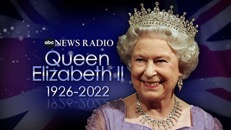
The queen was preceded in death by her husband of more than 70 years, Prince Philip, who died April 9, 2021, at the age of 99.
Queen Elizabeth is survived by her three sons, Princes Charles, Andrew and Edward; one daughter, Princess Anne; eight grandchildren, Princes William and Harry of Wales, Princesses Beatrice and Eugenie of York, and Peter and Zara Phillips, as well as Lady Louise Windsor and James, Viscount Severn. She is also survived by 12 great-grandchildren.
Queen Elizabeth’s eldest son, Charles, the Prince of Wales, will succeed her as king at a date to be determined. His wife, Camilla, the Duchess of Cornwall, is expected to become queen consort, a title that Queen Elizabeth requested Camilla be granted at the time of her Platinum Jubilee celebration earlier this year.
Charles’s eldest son, Prince William, is now heir to the throne.
In June, the queen celebrated her Platinum Jubilee, marking 70 years on the throne. She attended just three events during the four-day celebration due to what Buckingham Palace described at the time as “some discomfort.” The previous October, she’d been hospitalized overnight for what Buckingham Palace described as “preliminary investigations.” She also tested positive for COVID-19 in February but experienced only “mild cold-like symptoms” as a result of the virus, according to the palace. Two months later, in April, the queen celebrated her 96th birthday at Sandringham, her country estate in Norfolk.
Princess Elizabeth Alexandra Mary was born in London on April 21, 1926, a granddaughter of King George V and the first child of Prince Albert, the Duke of York, and his wife, Lady Elizabeth Bowes-Lyon, a daughter of Scottish nobility. The family’s lives changed in 1936, when King George V died and his eldest son became King Edward VIII.
Edward VIII soon famously began a relationship with American divorcee Wallis Simpson. The romance triggered a constitutional crisis that ended with Edward giving up the throne to marry Simpson. Elizabeth’s father, Albert, adopted his father’s name and became King George VI — leaving 10-year-old Elizabeth, his eldest daughter, as heir to the throne.
When her father died on February 6, 1952, after years of declining health, Queen Elizabeth II ascended the British throne at age 25; some Britons were so thrilled by the young queen they declared it was a second “Elizabethan Age.”
Queen Elizabeth II’s reign spanned 14 U.S. American presidents and just as many British prime ministers. Along the way, she proved herself a savvy stateswoman and a constant leader on the world stage. She traveled on more than 271 state visits during her reign and was sometimes the only woman on the stage with world leaders. She always stayed mum on her personal political opinions, demonstrating her mastery of “soft diplomacy.”
As recently as June 2021, Queen Elizabeth II met with world leaders at a Group of 7 summit meeting in Cornwall, and hosted President Biden and first lady Jill Biden at Windsor Castle afterward.
In addition to being sovereign of the United Kingdom and 15 Commonwealth realms, the Queen was also the head of the Commonwealth, a voluntary association of 54 independent countries. During her reign, she visited nearly every country in the Commonwealth — missing only Cameroon and Rwanda — and made many repeat visits, according to the royal family’s official website.
As popular as she was, the Queen weathered particularly harsh scrutiny over her alleged poor treatment of Princess Diana, whom then-32-year-old Prince Charles married in 1981, when the former Diana Spencer was 25. Diana later accused Charles of having an affair with his now-wife, Camilla, the Duchess of Cornwall, while Diana by all accounts had a hard time adjusting to the pressures of royal life, including merciless hounding by the press, and felt that she received little support from Buckingham Palace.
Diana and Charles’ divorce was finalized in August, 1996. Just one year later, on August 31, 1997, Diana died at age 36 following a car crash in the Pont D’Alma Bridge in Paris during which her car, in which she was traveling with her romantic partner, Dodi Fayed, was pursued by paparazzi.
Much beloved the world over, Diana’s death plunged Britons into grief that soon turned to anger when the Queen was absent during public tributes and made no official statement of her own. Facing increasing public criticism, Elizabeth ultimately returned to London from Balmoral Castle, where she and Prince Philip had been when the accident occurred, along with Diana’s two sons. The Queen delivered an address to the nation praising her former daughter-in-law. At Diana’s funeral procession, Queen Elizabeth II was seen bowing as the cortege passed by.
If tradition is observed, Queen Elizabeth II’s death will be followed by ten days of official national mourning before her funeral is held at Westminster Abbey, in London. Her remains will be interred at Windsor Castle.
Source: nrgmediadixon.com



